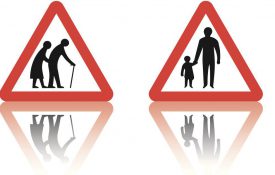-

Employees Changed Their Drinking Habits After the Recession
If research on drinking in the wake of the Great Recession is any indication, financial insecurity has a strong influence on drinking habits.
-
The secrets the world’s top experts use to make really good predictions
The Washington Post: History often isn’t kind to those who go on the record making predictions. Albert Einstein once said that nuclear energy would never be a thing, while Margaret Thatcher predicted that a woman would never be prime minister in her lifetime. And remember the record executive who said the Beatles had no future in show business? People are often spectacularly bad at forecasting the future. But they don’t have to be, says Philip Tetlock, a professor at the University of Pennsylvania who has spent decades studying how people make predictions.
-
How Images Trigger Empathy
The Atlantic: While looking back and trying to make sense of a year just ended, we often focus on its most hopeless parts, the violence and acrimony. Last year did include plenty of negativity to mourn. But it also reminded us of an important lesson about how to access our better angels. Three recent events shined a light on how empathy works—and one reason why it often does not. The first occasion involved the Syrian civil war. Over the course of four years, more than 200,000 Syrians were killed and over 3 million fled the country seeking refuge.
-
How Expressing Gratitude Might Change Your Brain
New York Magazine: A lot of so-called “positive psychology” can seem a bit flaky, especially if you’re the sort of person disinclined to respond well to an admonition to “look on the bright side.” But positive psychologists have published some interesting findings, and one of the more robust ones is that feeling grateful is very good for you. Time and again, studies have shown that performing simple gratitude exercises, like keeping a gratitude diary or writing letters of thanks, can bring a range of benefits, such as feelings of increased well-being and reduced depression, that often linger well after the exercises are finished.
-

Older Adults Are Bigger Risk Takers in High-Poverty Countries
People’s propensity to take physical, social, legal, or financial risks typically decreases as they age, but not in countries with high poverty and income inequality, according to new research published in Psychological Science, a journal
-
New Research From Psychological Science
Read about the latest research published in Psychological Science: Neural Discriminability of Object Features Predicts Perceptual Organization Emily J. Ward and Marvin M. Chun In this study, participants viewed objects that varied in color, shape, and orientation while undergoing functional magnetic resonance imaging (fMRI). Participants then performed a perceptual grouping task outside of the scanner, using the same objects as in the fMRI task. The researchers found that activity patterns in the lateral occipital cortex -- an area of the brain involved in high-level vision -- discriminated between the different object features.

